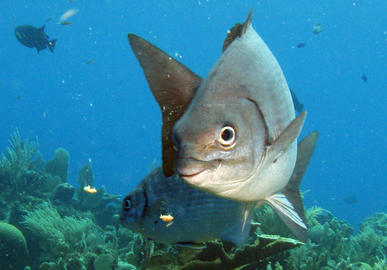Nine REEF members joined REEF Director of Science, Dr. Christy Pattengill-Semmens, for a Field Survey week in Nevis last week, kicking off the 2012 REEF Trip season with a bang. The group stayed at Oualie Beach Resort on Nevis and dove with the on-site dive operator, Scuba Safaris. Over 120 surveys were conducted, which is a great addition to the REEF database for this region (prior to this trip, there were only 7 surveys from Nevis). Each afternoon, the group would gather for a few hours to discuss the day's sightings, review images and video, and enter survey data.
Speed Dating Fishy Style: How Fish Spawn and When You're Likely to Catch Them in the Act
Every month, scientists, government agencies, and other groups request raw data from REEF’s Fish Survey Project database. Here is a sampling of who has asked for REEF data recently and what they are using it for:
-A researcher from Florida International University is using REEF data from the Florida Keys to study changes in trophic interactions as a result of changes in top level predator communities in no-take reserves.
- A great last minute opportunity to join renowned photographer and REEF co-founder, Paul Humann, for a week of fish watching and learning. Two spaces (one cabana) just opened up on each week of his upcoming trip to the San Blas Islands in the Caribbean Sea off Panama, June 9-16 and June 16-23, 2012. You will stay in one of these beautiful over-water bungalows. Grab a space before it's too late. Email or call our friends at Caradonna today. 1-877-295-7333 (REEF), REEF@caradonna.com.
REEF is proud to announce the next generation of our website - www.REEF.org. The redesigned page was launched earlier this month. The website still features the wealth of information, tools, and resources you expect from REEF.org, but now they are highlighted with a new design and user friendly navigation. Aside from the new look, you may notice that the site is much faster due to an upgrade in our server equipment.




